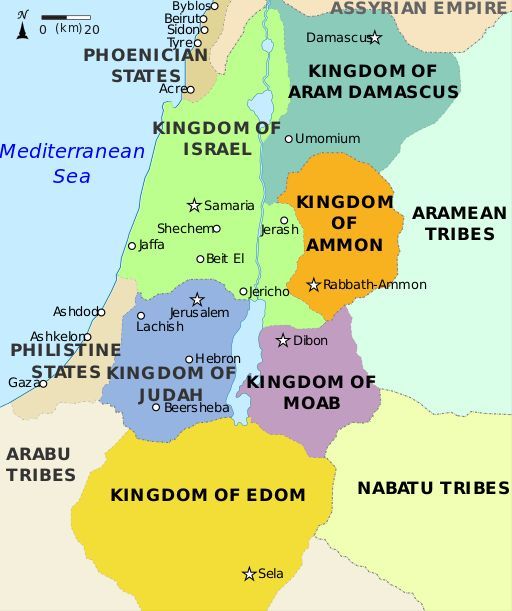Obadiah's Message to Edom
Ok, time for a quick geography and history lesson. I promise it will be quick! Edom was Israel and Judah’s neighbor to the southeast. They occupied a land mass that was roughly equivalent to the kingdoms of Israel and Judah, and they, like so many of Israel’s neighbors, had a complicated history with the people whom God had chosen. Perhaps, though, we can summarize it by saying that the relationship that Jacob had with his brother, Esau, in Genesis 25-33 was pretty similar to Israel’s history with Edom. There was fighting, bickering, backstabbing, and an occasional alliance. You can see below in the map there where Edom was located in relationship to Israel and Judah.

See, I told you it would be quick!
Enter Obadiah.
Obadiah is a prophet who prophesied concerning the nation of Edom in relation to their actions (or inactions) with the people of Israel/Judah. It is somewhat difficult to date when this prophet lived and prophesied, but a safe guess is right around the time of the Babylonian Exile of the nation of Judah (roughly 587-586 BCE).
Obadiah comes onto the scene and he begins to criticize the nation of Edom for the way that they have treated Judah, and, in fact, failed to understand and act on the will of God.
Obadiah’s book is a short one–we break it into just one chapter with 21 verses. However, you almost need to have read or at least be well versed in the story of Jacob and Esau, already mentioned in Genesis 25-33. The reason being that the drama that unfolds between those two brothers helps to make clear that God is working in the world, God does have a purpose for history, and God is able to use anyone and everyone–even someone with the slippery character and morality of Jacob–for his purposes. The nations of Edom and Judah are referred to consistently as Esau and Jacob in Obadiah’s message.
And here’s the crazy thing too: God’s message through Obadiah is for the people of Edom. People who we only get snapshots of their history and story throughout the pages of Scripture, but a people that we can draw some inferences from the story that is told in the Bible.
Firstly, Esau, although the firstborn, is not chosen to carry on the line that God has made his covenant with. Instead, that will pass to his younger twin brother, Jacob. We may view this as a rejection of sorts, but that is not what God intends. God consistently chooses someone who is not the firstborn in the book of Genesis so that we will see and understand that God’s promises and God’s love shown through this covenant are not just for the ones that we typically might select as deserving. It is the story of the Gospel on display in the first pages of the Bible. God’s grace is for everyone–not for those who we might anticipate as deserving.
Second, God still works with and through the people of Edom. The book of Obadiah makes it clear that God has expectations of this people. That they are to live in a certain way. That they should understand God’s will and purpose for them, just as Israel was meant to understand God’s purpose for them too. Edom has a role to play. God is not absent from their lives. Even though we do not have Edom’s story in the same depth and detail as we have with Israel, I think it is safe to assume that God was working in their lives and through their history too. God did not abandon them, but God did invite them to a way of living that would ultimately glorify him and allow for the nation of Edom to live in relationship with God too.
And last, Obadiah’s message to the people of Edom is also a preview of the Gospel message and even of Jesus himself. Obadiah 15 says: “As you have done, so it will be done to you.”
Obadiah quotes “the golden rule” before Jesus does! This, I think is critical. God wants the nation of Edom to live according to his will too. Just as Israel is meant to show the rest of the world the nature, character, and attributes of God, so too is Edom. They are to live in such a way that the very presence of God is on display. They are to inhabit the values and characteristics of love, justice, mercy, compassion, humility, integrity, and any other virtue you can think of that God proscribes for his people, his creation.
So, today, if you are feeling like an “Outsider,” take heart. For God desires that there be no such thing. The Kingdom of Heaven is open wide. It is open to you. When you feel far from God, remember that God is always on the lookout for the prodigal children who have left God behind. He is ready to run to you. God’s people are not just those who we think are well-deserving. We have all been chosen and adopted into the family of God. May we be good stewards of that gift to us all.

